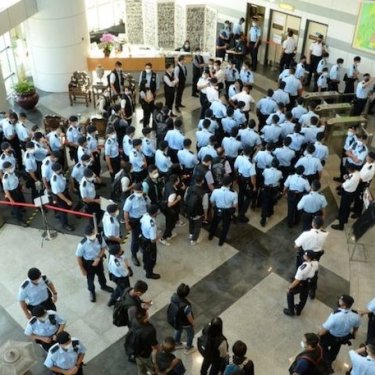Hong Kong: At least 900 journalism jobs lost, media in exile after four years of draconian National Security Law

Four years after the enactment of a draconian national security law – a turning point in the decline of press freedom in Hong Kong – Reporters Without Borders (RSF) takes a closer look at the plight of exiled journalists and calls for greater support for their diaspora-led media.
Since Hong Kong’s National Security Law (NSL) was enacted on 30 June 2020, at least 900 journalists lost their jobs according to RSF’s statistics. Hundreds of these reporters moved overseas, and 10 media outlets were established by this diaspora in countries such as Taiwan and the United Kingdom. “Only 5% of my former Apple Daily colleagues continue to work as journalists, while the majority changed their career paths,” explains editor-in-chief of Photon Media, Shirley Leung Ka Lai. “Leaving Hong Kong made me feel helpless, but establishing a diaspora media empowered me, made me feel resistant and less guilty for leaving my homeland behind,” she adds.
“While diasporic media represent an invaluable source of information in Hong Kong, where press freedom is in free fall, they remain vulnerable and too often struggle to become sustainable. We call on the international community to provide exiled journalists and their media with tangible support, including open visa schemes as well as ambitious grant and development programmes.
The 10 newly established media mainly operate online, and include Photon Media in Taiwan, The Chaser and Green Bean Media in the UK, and Points Media, whose journalists are based all over the world. The most recent addition is The Hong Konger, an online magazine created by reporters exiled in the UK, that “takes Hong Kong as a concept beyond its geographical location.”
The effect of “red lines”
Under the restrictive NSL, journalists still based in Hong Kong must navigate new additions to China’s “red lines” – topics that are taboo for journalists to cover – leaving it up to diasporic media to cover sensitive topics and counter disinformation from the Chinese regime. “Currently, all existing media in Hong Kong practice self-censorship to varying degrees. Media outlets located outside Hong Kong can report with relative freedom, without ‘red lines’ and select news or angles that have already ‘disappeared’ in Hong Kong,” explains Edward Ka Chung Li, former news chief editor of Apple Daily.
Challenges for the exiled press
The future of these diaspora-led media remains uncertain due to financial difficulties. “Overseas diaspora outlets lack resources and have limited manpower. To maintain independence, they do not rely on advertising, but rather depend on readers' subscriptions,” says Li. “After the enactment of domestic national security law, donating to diaspora media through crowdfunding could be considered as supporting foreign forces, and even subscriptions dropped significantly, making it difficult for us to continue our work,” Shirley Leung adds.
In the past 4 years, the Hong Kong government has used existing laws as a pretext to prosecute at least 28 journalists and press freedom defenders – 10 of whom are still in jail – and to shutter two major independent media outlets, Apple Daily and Stand News. At the same time, journalists' associations have been repeatedly harassed by authorities, creating a climate of fear that led at least five smaller media outlets to cease their operations. What’s more, an RSF representative was barred from entering the territory.
RSF provided financial assistance to 460 journalists in 62 countries in 2023, including in Hong Kong; two-thirds of the funds covered the relocation or resettlement costs of exiled journalists. RSF also developed an ambitious skills-building programme for journalists covering China, including Hong Kong, providing at least 890 journalists with online and in-person training sessions in Mandarin, Cantonese and English.
Hong Kong is ranked 135th in RSF’s 2024 World Press Freedom Index, having plummeted down the rankings from 18th place in just two decades. China ranks 172nd of the 180 countries and territories surveyed.
